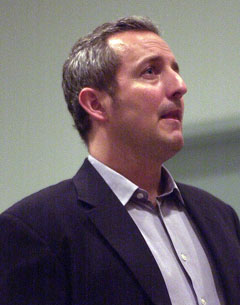Scientiae et Virtuti – the motto of our College, the two domains of Academia, and often represented in an ‘either/or’ fashion: either you study in the laboratory or the library. Either you observe streptococcus under a microscope or read Aristotle over a cup of coffee. Either you learn what is, or you learn what ought to be. Either something is only of the body, or it is only of the soul.
 Not necessarily, said Dr. Edward Slingerland to a crowded Baxter 101 room Thursday night during his talk "Cognitive Science and Early Confucian Ethics," the 2008 Peebles Lecture.
Not necessarily, said Dr. Edward Slingerland to a crowded Baxter 101 room Thursday night during his talk "Cognitive Science and Early Confucian Ethics," the 2008 Peebles Lecture.
Dr. Slingerland is the Associate Professor of Asian Studies at the University of British Columbia. He is also the co-founder and director of the University’s new Centre for the Study of Human Evolution, Cognition, and Culture, and holds the Canada Research Chair in Chinese Thought and Embodied Cognition. He received his B.A. from Stanford in Asian Languages, an M.A. from UC Berkeley in East Asian Languages, and a Ph.D. in Religious Studies from Stanford University.
Dismissing the validity of ethical utilitarianism, Dr. Slingerland emphasized the importance of instinctual emotional responses in our ethical decision-making. He proposed, rather than a system of ethics based on rational calculations, an Aristotelian system of "virtue ethics." In this system, ethics are influenced by the situation or event that prompts their consideration. For example, rather than learning the definition of courage and then applying it to one’s life, one should observe courageous people in trying situations and then strive to model their courageous behavior in similar situations.
He then cited three innate moral emotions – empathy, justice, and disgust – and gave experimental examples of why a utilitarian model of ethics can not accurately explain human decision-making.
"Human beings engage in altruistic punishment," said Slingerland. By this, humans uphold their sense of justice and dismiss what would benefit them. He cited a recent experiment in cognitive science known as the "Ultimatum Game." One player is given $100 and told to share some of it with a second player. If the second player accepts the amount of money proposed by the first player, then both get to keep the money. If the second player declines, neither player receives anything.
"The most logical thing," said Slingerland, "would be to give the second person a penny and walk away with $99.99. However, rarely anyone does this, and when they do, the second person nearly always refuses the money."
After showing results of recent cognitive science experiments that suggest something more than logic influencing decision-making, Dr. Slingerland presented the ethical views of Mencius, a follower of Confucius.
"Mencian morality is based upon gut or emotional reactions" said Slingerland. He explained the four sprouts of Mencius’s ethics - benevolence, righteousness, ritual propriety, and wisdom – and showed how each emphasized the effect of emotions on decision-making. What cognitive science recently suggested, then, is what Mencius, 2200 years ago, wrote to the Emperors and people of China.
He then concluded by stating that "moral education is about imaginative extension," and "morality can be grounded in empirical claims about human nature."
"Shared innate moral taste," said Slingerland, "can serve as basis for objectivity."
Dr. Slingerland’s recent book, What Science Offers the Humanities: Integrating Body and Culture was given to students over the last few days on a first-come, first-serve basis, and additional copies are now being sold in the bookstore for $24.99.
Photos by Elijah Sanders '10